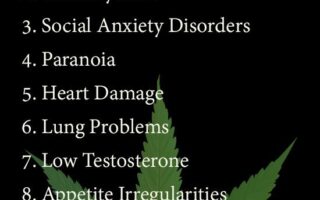In the ever-evolving landscape of cannabis culture, the narrative surrounding marijuana is often painted with bold strokes—euphoria, relaxation, and medicinal miracles dominate the canvas. Yet, amidst these vibrant hues lies a less celebrated story: the paradox of the marijuana headache. As more individuals turn to cannabis for relief from various ailments, some find themselves grappling with an unexpected twist—a pounding headache in the wake of their experience. This phenomenon raises critical questions about the complexities of cannabis use, the body’s response to its compounds, and the potential drawbacks that can accompany its celebrated benefits. In this exploration, we will delve into the intricacies of marijuana headaches, examining their causes, symptoms, and potential remedies, all while navigating the delicate balance between the highs and lows of this multifaceted plant.
Table of Contents
- Understanding Marijuana Headaches: Causes and Symptoms
- Navigating the Aftermath: How to Alleviate Discomfort
- Preventive Measures: Strategies to Avoid Marijuana-related Headaches
- When to Seek Help: Recognizing Serious Concerns
- Q&A
- Key Takeaways
Understanding Marijuana Headaches: Causes and Symptoms
Headaches associated with marijuana consumption can be both perplexing and discomforting for users. While many individuals turn to cannabis seeking relief from various ailments, some may experience headaches as an unintended side effect. Common *causes* include:
- Dehydration: Consuming marijuana, especially in higher doses, can lead to dehydration, triggering headaches.
- Withdrawal Symptoms: Regular users may experience headaches when reducing or stopping consumption.
- Low Quality Cannabis: Contaminants or chemicals in poorly produced marijuana can contribute to headaches.
- Overconsumption: Taking too much THC can lead to increased pressure in the head.
Individuals experiencing cannabis-related headaches often report a range of symptoms that can vary in intensity and duration. These symptoms may include:
- Pulsating Pain: Some users report a throbbing sensation, similar to tension headaches.
- Nausea: Accompanying nausea can make the experience more debilitating.
- Light Sensitivity: Increased sensitivity to light can exacerbate headaches.
- Fatigue: Overall fatigue may also accompany the pain, making it difficult to focus.
Navigating the Aftermath: How to Alleviate Discomfort
Experiencing discomfort after consuming marijuana can be disorienting and frustrating. To alleviate the nagging headache that sometimes follows, consider employing a variety of tactics. Hydration is key; drinking adequate water helps flush out residual cannabinoids and can significantly reduce the intensity of headaches. Additionally, implementing breathing exercises or gentle stretches may enhance blood circulation and promote relaxation. Try incorporating activities like:
- Deep breathing techniques: Inhale deeply for four counts, hold for four, and exhale slowly for six.
- Gentle yoga poses: Child’s pose or cat-cow can help relieve tension.
- Meditation: Spending even a few minutes in silence can clear your mind and ease discomfort.
If you’re still feeling the effects of a marijuana headache, consider dietary adjustments to help stabilize your condition. Consuming foods rich in magnesium or omega-3 fatty acids can have a soothing effect as they may help reduce inflammation. Here’s a quick overview of foods that might offer relief:
| Food Type | Health Benefits |
|---|---|
| Spinach | High in magnesium, helps in muscle relaxation. |
| Salmon | Rich in omega-3s, reduces inflammation. |
| Almonds | Contains magnesium, can improve headache symptoms. |
Preventive Measures: Strategies to Avoid Marijuana-related Headaches
Preventing marijuana-related headaches can significantly enhance your overall experience and well-being. Consider implementing the following strategies to minimize the risk of discomfort:
- Stay Hydrated: Ensure adequate water intake before, during, and after using marijuana, as dehydration can trigger headaches.
- Use Moderation: Limit your consumption to a suitable amount for your tolerance level, as overindulgence may lead to side effects.
- Choose High-Quality Strains: Opt for strains known for their therapeutic benefits and reduced likelihood of side effects, focusing on those with a balanced ratio of THC to CBD.
- Monitor Triggers: Pay attention to other potential headache triggers such as stress or dietary factors and work to minimize these.
Incorporating mindfulness techniques into your routine can also be beneficial. Integrating practices such as slow, deep breathing or gentle yoga can help alleviate tension and promote relaxation. Consider keeping a simple log to track your consumption patterns and associated effects to identify what works best for you:
| Date | Strain Used | Dosage | Headache Severity (1-10) |
|---|---|---|---|
| 01/10 | Blue Dream | 1g | 3 |
| 01/11 | Girl Scout Cookies | 0.5g | 2 |
| 01/12 | OG Kush | 1.5g | 5 |
When to Seek Help: Recognizing Serious Concerns
When experiencing headaches that seem to coincide with marijuana use, it’s essential to discern the difference between mild discomfort and potential underlying issues. Persistent symptoms or headaches that become increasingly severe may signal a need for further evaluation. Pay attention to the following warning signs that suggest you should consult a healthcare professional:
- Frequent occurrence: More than a few times a month.
- Duration: Headaches lasting longer than 72 hours.
- Accompanying symptoms: Such as visual disturbances, nausea, or sensitivity to light.
- Changes in intensity: Notable increase in pain intensity compared to past experiences.
- Medication dependence: Needing over-the-counter pain relief frequently to cope.
If you notice any of these signs, it’s crucial to address them promptly. In some cases, headaches may not be directly linked to marijuana itself but could be indicative of other conditions like migraines, tension-type headache disorders, or withdrawal symptoms. Tracking your headache patterns through a simple chart can help you and your healthcare provider identify potential triggers and better understand when to seek assistance. Below is a straightforward template to document your experiences:
| Date | Time | Duration | Severity (1-10) | Possible Triggers |
|---|---|---|---|---|
| MM/DD/YYYY | HH:MM | HH:MM | 5 | Stress, Dehydration |
| MM/DD/YYYY | HH:MM | HH:MM | 8 | Insufficient Sleep |
Q&A
Q&A: Understanding Marijuana Headaches
Q: What exactly is a marijuana headache?
A: A marijuana headache is often described as a headache that occurs after the use of cannabis. While many people use marijuana to alleviate pain or migraines, some individuals report experiencing headaches as a side effect, either during or after consumption.
Q: What causes a headache after using marijuana?
A: The exact cause can vary from person to person. Some potential triggers include dehydration, low blood sugar levels, the specific strain of cannabis used, or even withdrawal from THC after regular use builds up tolerance. Other factors can be sensitivity to certain cannabinoids or terpenes in the plant.
Q: Are there particular strains of marijuana that are more likely to cause headaches?
A: While everyone’s body reacts differently, some users report that high-THC strains tend to be more problematic. Strains that are heavier in CBD or those specifically bred for therapeutic effects may be less likely to trigger headaches for some individuals. It’s all about finding what works best for your body chemistry.
Q: How can one prevent marijuana headaches?
A: Prevention may include staying hydrated, consuming cannabis with food, and gradually introducing new strains to your routine. It’s also wise to monitor your dosage; starting with lower doses and increasing them gradually can help you find a comfortable level without adverse effects.
Q: What should someone do if they experience a headache after using marijuana?
A: If a headache strikes, consider drinking water to stay hydrated. Over-the-counter pain relievers may also provide relief, but it’s essential to listen to your body. If headaches persist after consuming marijuana, it may be beneficial to re-evaluate your usage habits, consult with a healthcare provider, or consider abstaining completely.
Q: Are there populations more at risk for marijuana headaches?
A: While anyone can experience marijuana headaches, those who use cannabis infrequently, individuals who are new to cannabis, or those with certain pre-existing health conditions may be more susceptible. Tolerance levels and individual brain chemistry play significant roles in how cannabis affects headaches.
Q: Is there any research on marijuana headaches?
A: The research is still emerging, but anecdotal evidence suggests that the phenomenon is not uncommon. More studies are needed to understand the complex relationship between cannabis use and headaches fully. As the stigma around cannabis lessens, we may see more scientific investigation into its effects.
Q: Should headaches caused by marijuana deter a person from using cannabis altogether?
A: Not necessarily. Many people find relief and therapeutic benefits from cannabis despite occasional headaches. It’s crucial to weigh the pros and cons for yourself. If headaches become a consistent issue, however, it may be worth reevaluating your approach or seeking advice from a knowledgeable professional.
while marijuana headaches can be an unwelcome side effect for some, understanding the causes and taking preventive measures can enhance the overall experience with cannabis. Always remember that personal sensitivity varies, so taking time to discover what works best for you is key.
Key Takeaways
the relationship between marijuana and headaches is a complex tapestry woven from individual experiences, physiological responses, and the ongoing evolution of cannabis research. While some users may find relief from their headaches with cannabis, others might inadvertently invite new discomforts. As with any potential remedy, it is essential to approach marijuana with a balanced perspective, weighing both its benefits and drawbacks.
Continued research will undoubtedly shed light on the nuanced effects of cannabis, empowering individuals to make informed choices about its use for headache relief. As we navigate this ever-evolving landscape, remember that what works for one person might not work for another. the journey towards finding relief is deeply personal, and understanding your own body’s response to cannabis could be the key to unlocking the answers you seek. Whether you’re exploring cannabis as a treatment option or seeking alternatives, may your path lead you to clarity and comfort.



